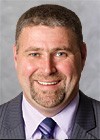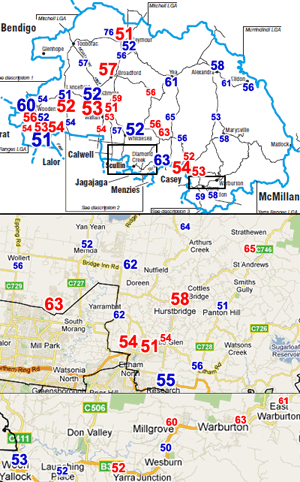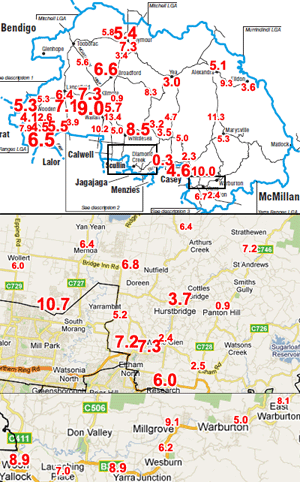Electoral Form Guide: Mcewen
Electorate: McEwen
Margin: Liberal 0.0%
Location: Central Southern, Victoria
Outgoing member: Fran Bailey (Liberal)
In a nutshell: Covering much of the area devastated by the February 2009 bushfires, McEwen produced one of the closest results of recent memory in 2007 when Liberal member Fran Bailey prevailed by a court-determined margin of 27 votes. With Bailey now retiring, Labor’s Rob Mitchell will be hoping to succeed where he narrowly failed in 2007, despite the Liberals’ astute endorsement of a police officer credited with saving lives during the bushfires.
The candidates
|
|
ROB MITCHELL
|
|
|
Two-party vote map
|
Swing % map |
Electorate analysis: McEwen extends from outer north-eastern suburbs of Melbourne including Healesville and Craigieburn deep into central Victoria, taking in Seymour and Eildon in the north. This closely corresponds with the area most heavily devastated by the February 2009 bushfires, the destroyed towns of Kinglake and Marysville being respectively located in the central south and east. The electorate was created with the expansion of parliament in 1984 and held for its first two terms by Labor’s Peter Cleeland, who was unseated in 1990 by Fran Bailey as part of a statewide swing that cost Labor nine seats. Cleeland recovered the seat with a 0.7 per cent margin in 1993, but was again defeated by Bailey in 1996. As in so many other marginal seats, the swing to Labor in 1998 was well below the national average, a circumstance that allowed the Howard government to win re-election from a minority of the national two-party vote. After a slight swing to Bailey in 2001, the seat exited the marginal zone for the first time in 2004 following a 1.0 per cent redistribution boost and a 4.2 per cent swing.
Bailey was left with a 6.4 per cent margin going into the 2007 election, which she ended up needing every bit of. At first blush the result was the closest in any federal election since Ian Viner’s 12-vote victory in the Perth seat of Stirling in 1974: Labor challenger Rob Mitchell won by seven votes on the first count, but a recount turned that to 12 in favour of Bailey. Labor launched a legal challenge against the result, complaining among other things that a ballot had been admitted on which the voter had crossed out the candidates’ names and replaced them with those of V8 Supercar drivers. The Federal Court finally made its ruling on the case in July 2008, and proved even more liberal in its determinations than Labor had counted on: 142 votes that had originally been rejected were admitted on the basis that the numbers were “reasonably discernible”. Unfortunately for Mitchell, 76 of these votes were for Bailey against 66 for himself, so that Bailey’s official winning margin increased to 27.
Fran Bailey announced she would not contest the next election in October 2009, which disappointed Liberals who hoped the esteem she gained during the bushfire crisis would stand her in good stead. On that basis the party has done well to nominate Cameron Caine, a Kinglake police officer credited with saving several lives during the emergency, and who later became president of the Kinglake Football Club. Labor has again nominated Rob Mitchell, a Right faction member who held a seat for the state upper house province of Central Highlands from 2002 until he was frozen out by the electoral reforms that took effect in 2006.
 Although he was said to maintain “strong local numbers”, Mitchell was installed as candidate by the party’s national executive. Another hopeful frozen out by the intervention was Andrew MacLeod, a former soldier and United Nations disaster expert who ran in 2001. Misha Schubert of The Age reported in October 2009 that deals had reserved the seat for the Right sub-faction associated with Stephen Conroy and Bill Shorten.
Although he was said to maintain “strong local numbers”, Mitchell was installed as candidate by the party’s national executive. Another hopeful frozen out by the intervention was Andrew MacLeod, a former soldier and United Nations disaster expert who ran in 2001. Misha Schubert of The Age reported in October 2009 that deals had reserved the seat for the Right sub-faction associated with Stephen Conroy and Bill Shorten.
 McEwen was covered by two composite marginal seat polls in the second last week of the campaign. Newspoll’s survey of 600 voters across three Victorian marginals remarkably showed a swing to Labor of 6.2 per cent – at least 3 per cent higher than the statewide trend – while Galaxy’s survey of 800 respondents in four seats had it at a far more modest 1.6 per cent. On the last Tuesday of the campaign, Roy Morgan targeted a micro-sample of 200 voters in McEwen, which had Labor leading 55.5-44.5, although the margin of error was approaching 7 per cent. The JWS Research-Telereach poll conducted during the final weekend of the campaign, covering 400 respondents in the electorate with a margin of error of about 5 per cent, had Labor leading 56.5-43.5.
McEwen was covered by two composite marginal seat polls in the second last week of the campaign. Newspoll’s survey of 600 voters across three Victorian marginals remarkably showed a swing to Labor of 6.2 per cent – at least 3 per cent higher than the statewide trend – while Galaxy’s survey of 800 respondents in four seats had it at a far more modest 1.6 per cent. On the last Tuesday of the campaign, Roy Morgan targeted a micro-sample of 200 voters in McEwen, which had Labor leading 55.5-44.5, although the margin of error was approaching 7 per cent. The JWS Research-Telereach poll conducted during the final weekend of the campaign, covering 400 respondents in the electorate with a margin of error of about 5 per cent, had Labor leading 56.5-43.5.
Analysis written by William Bowe. Read Bowe’s blog, The Poll Bludger.





